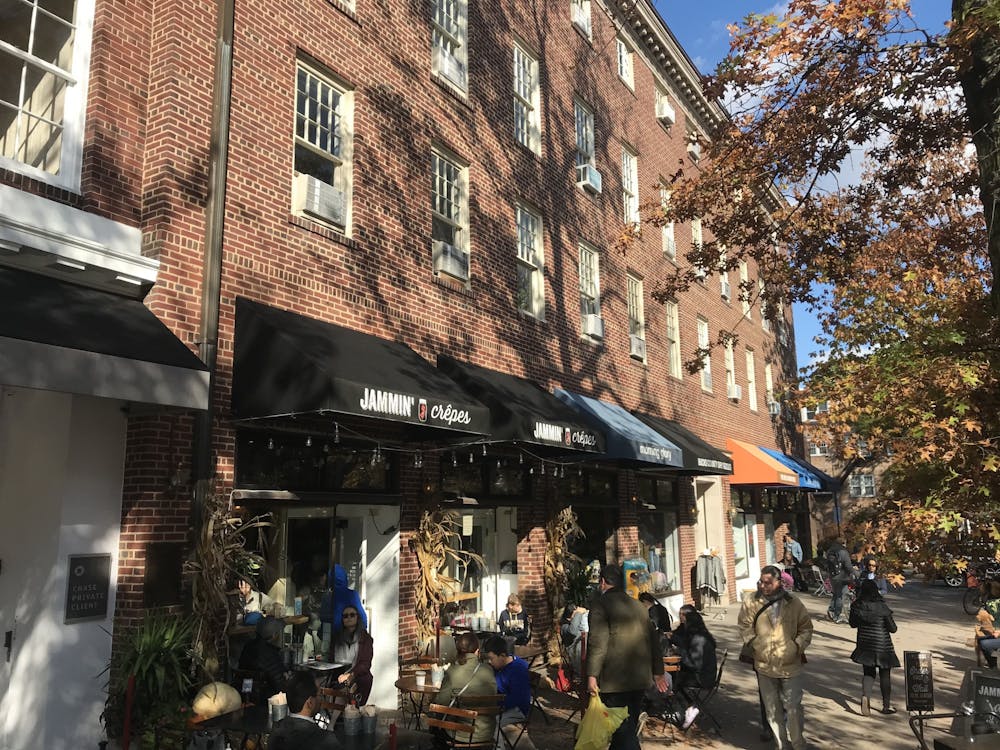At the start of the semester, students welcomed the University’s new Pay with Points program, a campus dining initiative championed by the Undergraduate Student Government (USG).
With the new program, each student on the unlimited meal plan receives $150 each semester (in the form of Dining Points) to spend at specific local businesses in the Princeton area, as well as at on-campus dining locations. All first-years and sophomores are required to hold the unlimited meal plan.
Students have generally responded positively to the program’s aims.
“As a student on financial aid, I feel like [Pay with Points] was really helpful for me to go out on [Nassau Street] with my friends without worrying about spending too much money,” Monica Jun ’26 wrote in a message to The Daily Princetonian, adding that she’s been using her points at The Bent Spoon and Jammin’ Crepes.
U-Councilor Stephen Daniels ’24, who chairs the Community Dining Task Force, said that the purpose of this program is to create “an opportunity for all students to be able to engage with some of the food options in town and on campus that aren’t a part of the meal plan.”
Daniels said he is optimistic that the program will also benefit the vendors.
“It’s going to be a big thing for the local economy,” he said. “The vendors have been really excited about it, and I’m certain that there’s going to be a lot of appetite for vendors to get involved in the program.”
As of now, it’s not clear whether the program has caused an uptick in business beyond FitzRandolph Gate.

Small World Coffee barista Allyson Cubler, who has worked at the coffee shop for almost a year, told the ‘Prince’ that she hasn’t noticed a significant increase in sales since the program began.
“Business just gets a little busier anyways when students come back [to campus],” she said.
This program has been in the works for several years, according to former USG Senator Brad Phelps ’22.
“I proposed a task force on community dining to create this sort of program,” he said, “and then we had COVID, so it shut down and we just restarted it last fall.”

To Phelps, the program is “a very visible demonstration of how students’ energy, opinions, enthusiasm, and feedback can shape university policy and programs.”
While students are excited about the program’s existence, many said they hope to see it expand and improve in the coming months. Jun said she “think[s] it would be nice if there were more sponsors.”
Other students similarly said they hope for a greater number of dining locations. Students specifically mentioned they hope to see Tacoria, Junbi Bubble Tea Shop, and Ficus make the list of participating eateries.
“Personally, I haven’t [used any points yet] because the places that they have the points for are not the places that I usually go to,” Audrey Chau ’25 told the ‘Prince.’
Chau is a former assistant opinion editor for the ‘Prince.’
“I don’t want to waste all of the points right away,” Jashvi Desai ’25 added, noting that she’d heard more locations would be added to the program and she’d rather save her points for after that happens. Desai suggested that USG could run a survey to collect student input about which eateries students would like to see added to the program.
“A few places that are relatively popular is a good start, but I wish it would include more dinner/lunch restaurants rather than coffee/dessert places,” Genevieve Cox ’25 wrote in a message to the ‘Prince.’ She’s used some points already for ice cream and at Coffee Club, but noted, “sometimes I want more substantial food rather than just snacks.”
Cox participated in the community dining pilot program in 2021 and previously spoke with the ‘Prince’ about the importance of this program for first-generation, low income students and students who “miss cultural cooking” from home. She noted that after seeing the program begin this year, she hopes the number of restaurants included will reach the greater array of options that were available as part of the pilot program.
For vendors currently included in the program, the process of integrating the new payment method seems to be going fairly smoothly. Although Coffee Club — Princeton’s student-run coffee shop in the basement of Campus Club — was not originally able to accept points when the program first started, student employee Gail Samuel ’25 confirmed that the popular café is now accepting points as payment.
“The process itself is very simple,” said Jun, who has paid with points a few times. “It’s actually very convenient to just tap my [student ID] against the sensor.”
Associate News Editor Sandeep Mangat contributed reporting.
Annie Rupertus is a sophomore from Philadelphia and a News Staff Writer who covers USG for the 'Prince.' She can be reached at arupertus@princeton.edu or @annierupertus on Instagram and Twitter.
Madeleine LeBeau is a Staff Writer for the ‘Prince.’ She can be reached at mlebeau@princeton.edu, on Instagram @madeleinelebeau, or on Twitter @MadeleineLeBeau.








